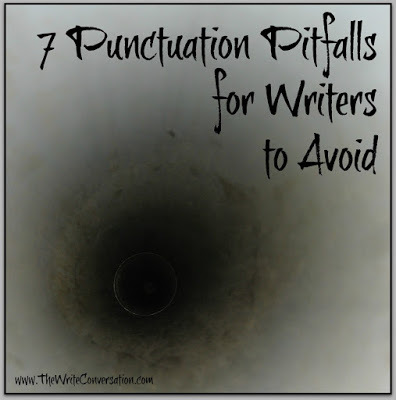7 Punctuation Pitfalls for Writers to Avoid
by Vonda Skelton @VondaSkelton
 First of all, here's my disclaimer: I am NOT an expert in English. I don't have a degree in English and wouldn't dream of trying to tell you how to create perfectly-punctuated pieces.
First of all, here's my disclaimer: I am NOT an expert in English. I don't have a degree in English and wouldn't dream of trying to tell you how to create perfectly-punctuated pieces.
That said, I do a fair amount of critiquing and do feel fairly confident in offering some general hints to finding the most frequent errors I see. And yes, I've seen variations of each of these examples in manuscripts I’ve critiqued.
These 7 punctuation pitfalls could mean the difference between an acceptance and a rejection in your writing life.1. When writing dialogue, place quotation marks around the spoken words, not the speaker tag.Correct: "You didn't tell me that," Tom said.Incorrect: "You didn't tell me that, Tom said."
2. Do not use semicolons or colons to denote dialogue in prose.Incorrect: Sally said: "I want you to go with me."
3. Start a new paragraph with each speaker, including any action or thoughts that speaker may have.Correct: "I will if you will." Sarah stared across the table at her little sister.
Carrie met her gaze. "I'm in."
 4. Be sure to include the dash, question mark, and exclamation mark within the quotation marks when they are part of the quoted material. Put them outside the quotation marks when they are part of the whole sentence.Correct: "Why do you say that? It wasn't me!" Jerry said.Incorrect: "Why do you say that? It wasn't me"! Jerry said.Correct: How can you call them "half-truths"?Incorrect: How can you call them "half-truths?"
4. Be sure to include the dash, question mark, and exclamation mark within the quotation marks when they are part of the quoted material. Put them outside the quotation marks when they are part of the whole sentence.Correct: "Why do you say that? It wasn't me!" Jerry said.Incorrect: "Why do you say that? It wasn't me"! Jerry said.Correct: How can you call them "half-truths"?Incorrect: How can you call them "half-truths?"
5. Do not use a question mark with an indirect question.Correct: He didn't ask how anyone could know that.Incorrect: He didn't ask how anyone could know that?
6. Use an ellipsis (three spaced periods) to denote omitted words in a quote, to designate a pause, or to show an unfinished statement.Correct: I pledge allegiance . . . with liberty and justice for all.Correct: "But I didn't know you were so . . . so . . . "
7. Use an em dash (two dashes) to indicate an interruption in dialogue, a break in thought or sentence structure, or a parenthetical explanation.Correct: "But you never said--"
"I never said what? Tell me!"Correct: Who would have thought--who could have thought--it would ever come to this?Correct: There were only three careers--doctor, lawyer, and Indian chief--that I would even consider.
Okay, so there they are, seven punctuation pitfalls you’ll want to avoid. Develop a keen eye and ear for such mistakes and you'll increase your chances of publication!
What mistakes bug you? Share your pet peeves below in the comments.
Don’t forget to join the conversation!Blessings,
Vonda
TWEETABLES7 Punctuation Pitfalls for Writers to Avoid - @VondaSkelton on @EdieMelson (Click to Tweet)
Learn the basics of punctuating dialogue - @VondaSkelton on @EdieMelson (Click to Tweet)
 Vonda Skelton is a speaker and the author of four books: Seeing Through the Lies: Unmasking the Myths Women Believe and the 3-book Bitsy Burroughs mysteries for children 8-12 yo. She’s the founder and co-director of Christian Communicators Conference, offering speakers’ training and community for Christian women called to ministry. Vonda is a frequent instructor at writer’s conferences and keynotes at business, women’s, and associational events. You can find out more about Vonda, as well as writing opportunities and instruction at her writer’s blog, The Christian Writer’s Den at VondaSkelton.com.
Vonda Skelton is a speaker and the author of four books: Seeing Through the Lies: Unmasking the Myths Women Believe and the 3-book Bitsy Burroughs mysteries for children 8-12 yo. She’s the founder and co-director of Christian Communicators Conference, offering speakers’ training and community for Christian women called to ministry. Vonda is a frequent instructor at writer’s conferences and keynotes at business, women’s, and associational events. You can find out more about Vonda, as well as writing opportunities and instruction at her writer’s blog, The Christian Writer’s Den at VondaSkelton.com.
 First of all, here's my disclaimer: I am NOT an expert in English. I don't have a degree in English and wouldn't dream of trying to tell you how to create perfectly-punctuated pieces.
First of all, here's my disclaimer: I am NOT an expert in English. I don't have a degree in English and wouldn't dream of trying to tell you how to create perfectly-punctuated pieces. That said, I do a fair amount of critiquing and do feel fairly confident in offering some general hints to finding the most frequent errors I see. And yes, I've seen variations of each of these examples in manuscripts I’ve critiqued.
These 7 punctuation pitfalls could mean the difference between an acceptance and a rejection in your writing life.1. When writing dialogue, place quotation marks around the spoken words, not the speaker tag.Correct: "You didn't tell me that," Tom said.Incorrect: "You didn't tell me that, Tom said."
2. Do not use semicolons or colons to denote dialogue in prose.Incorrect: Sally said: "I want you to go with me."
3. Start a new paragraph with each speaker, including any action or thoughts that speaker may have.Correct: "I will if you will." Sarah stared across the table at her little sister.
Carrie met her gaze. "I'm in."
 4. Be sure to include the dash, question mark, and exclamation mark within the quotation marks when they are part of the quoted material. Put them outside the quotation marks when they are part of the whole sentence.Correct: "Why do you say that? It wasn't me!" Jerry said.Incorrect: "Why do you say that? It wasn't me"! Jerry said.Correct: How can you call them "half-truths"?Incorrect: How can you call them "half-truths?"
4. Be sure to include the dash, question mark, and exclamation mark within the quotation marks when they are part of the quoted material. Put them outside the quotation marks when they are part of the whole sentence.Correct: "Why do you say that? It wasn't me!" Jerry said.Incorrect: "Why do you say that? It wasn't me"! Jerry said.Correct: How can you call them "half-truths"?Incorrect: How can you call them "half-truths?"5. Do not use a question mark with an indirect question.Correct: He didn't ask how anyone could know that.Incorrect: He didn't ask how anyone could know that?
6. Use an ellipsis (three spaced periods) to denote omitted words in a quote, to designate a pause, or to show an unfinished statement.Correct: I pledge allegiance . . . with liberty and justice for all.Correct: "But I didn't know you were so . . . so . . . "
7. Use an em dash (two dashes) to indicate an interruption in dialogue, a break in thought or sentence structure, or a parenthetical explanation.Correct: "But you never said--"
"I never said what? Tell me!"Correct: Who would have thought--who could have thought--it would ever come to this?Correct: There were only three careers--doctor, lawyer, and Indian chief--that I would even consider.
Okay, so there they are, seven punctuation pitfalls you’ll want to avoid. Develop a keen eye and ear for such mistakes and you'll increase your chances of publication!
What mistakes bug you? Share your pet peeves below in the comments.
Don’t forget to join the conversation!Blessings,
Vonda
TWEETABLES7 Punctuation Pitfalls for Writers to Avoid - @VondaSkelton on @EdieMelson (Click to Tweet)
Learn the basics of punctuating dialogue - @VondaSkelton on @EdieMelson (Click to Tweet)
 Vonda Skelton is a speaker and the author of four books: Seeing Through the Lies: Unmasking the Myths Women Believe and the 3-book Bitsy Burroughs mysteries for children 8-12 yo. She’s the founder and co-director of Christian Communicators Conference, offering speakers’ training and community for Christian women called to ministry. Vonda is a frequent instructor at writer’s conferences and keynotes at business, women’s, and associational events. You can find out more about Vonda, as well as writing opportunities and instruction at her writer’s blog, The Christian Writer’s Den at VondaSkelton.com.
Vonda Skelton is a speaker and the author of four books: Seeing Through the Lies: Unmasking the Myths Women Believe and the 3-book Bitsy Burroughs mysteries for children 8-12 yo. She’s the founder and co-director of Christian Communicators Conference, offering speakers’ training and community for Christian women called to ministry. Vonda is a frequent instructor at writer’s conferences and keynotes at business, women’s, and associational events. You can find out more about Vonda, as well as writing opportunities and instruction at her writer’s blog, The Christian Writer’s Den at VondaSkelton.com.
Published on November 13, 2015 01:00
No comments have been added yet.



